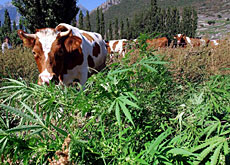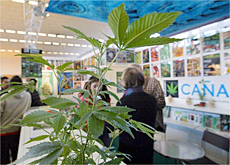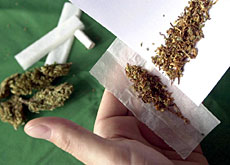Swiss cows banned from eating grass

Switzerland has banned the use of hemp as fodder for livestock over fears that traces of cannabis are finding their way into milk.
But the move has provoked strong opposition from farmers using the plant, while some experts have cast doubt over the evidence used to enforce the ban.
The Federal Agriculture Office said that the ban, which came into force on March 1, covers all types of hemp – the plant used to make the cannabis drug. Previously some species were authorised for farm use in Switzerland.
Spokesman Jürg Jordi said that hemp was no longer allowed because it had been found to contain low levels of THC, the active substance found in cannabis.
“We don’t want to have THC in milk because milk is a natural product,” Jordi told swissinfo.
The Swiss Farmers’ Association welcomed the move, saying farmers wanted to preserve the reputation of their milk and cheese products.
Came to light
Jordi said the problem came to light a few years ago after a small group of farmers started using hemp and publicising it as beneficial to health.
In one case, an agricultural company, SanaSativa, ran an advert that claimed hemp improved the quality of milk. SanaSativa is said to have around 60 Swiss farmers on its books.
“The authorities had to check [these claims], so we did and we recognised that THC could go through into milk, so it was very quickly clear that we couldn’t allow this method of feeding cows,” explained Jordi.
The mandate to check THC levels in milk was given to Agroscope, the Swiss Federal Research Station for Animal Production and Dairy Products.
Researcher Daniel Guidon said a Pakistani study had found traces of THC in children who had drunk milk from cattle that had eaten wild hemp. Added to this were separate tests undertaken by Agroscope which found traces of THC in milk.
“According to the regulation on animal fodder… fodder should not have negative effects on farm animal products,” said Agroscope in a statement.
“This is not the case when dairy cows are given hemp. Residues of THC in milk are unacceptable,” it added.
Unconvincing
But not all experts are convinced by these findings. Barbara Früh, fodder expert for Bio Suisse, the Swiss umbrella group for organic organisations, told swissinfo that the scientific foundations for banning hemp from fodder were rather “lean”.
The study undertaken by Agroscope involved feeding THC in pill form to cows, said Früh. A better solution would have been to undertake tests with hemp fodder containing a low amount of THC, she added.
Früh also pointed out that the Pakistan study involved animals – buffalo – that had eaten cannabis products and not hemp fodder.
“But should a correctly-carried out experiment find THC in milk, then I would also be favour of a [hemp] fodder ban,” Früh told swissinfo.
Opposition
Despite approval from the farmers’ union, the ban has encountered strong opposition from some farming quarters.
Stefan Selinger, a dairy farmer from the Zurich area, told the NZZ am Sonntag newspaper that the ban was an “overreaction”.
He added that since he had fed the plant to his cows they had been healthier and produced more milk.
As the ban applies to all animals, pig farmer Marianne Strasser has been hit as well.
“When the pigs are agitated… I give them hemp, then they are much quieter,” said Strasser who rations out the hemp and mixes it with peat.
Strasser told swissinfo that it is not the THC, but the essential oils in hemp which calm the pigs. Furthermore, it has not yet been proven that THC can get into meat, she says.
But Strasser doesn’t yet know if she’ll continue using the plant after the ban.
In any case, the Swiss Farmers’ Union has warned that those ignoring the ban will be reported and could face legal proceedings.
swissinfo
Hemp, cannabis sativa, is a fibrous plant that is used for rope and fabric, as well as for cannabis.
Hemp and “its products in all forms” have now been banned as animal fodder in Switzerland.
Previously the cultivation and feeding of hemp with low levels of THC to animals were allowed.
A small, but growing, number of farmers had been using hemp as fodder.

In compliance with the JTI standards
More: SWI swissinfo.ch certified by the Journalism Trust Initiative


You can find an overview of ongoing debates with our journalists here. Please join us!
If you want to start a conversation about a topic raised in this article or want to report factual errors, email us at english@swissinfo.ch.